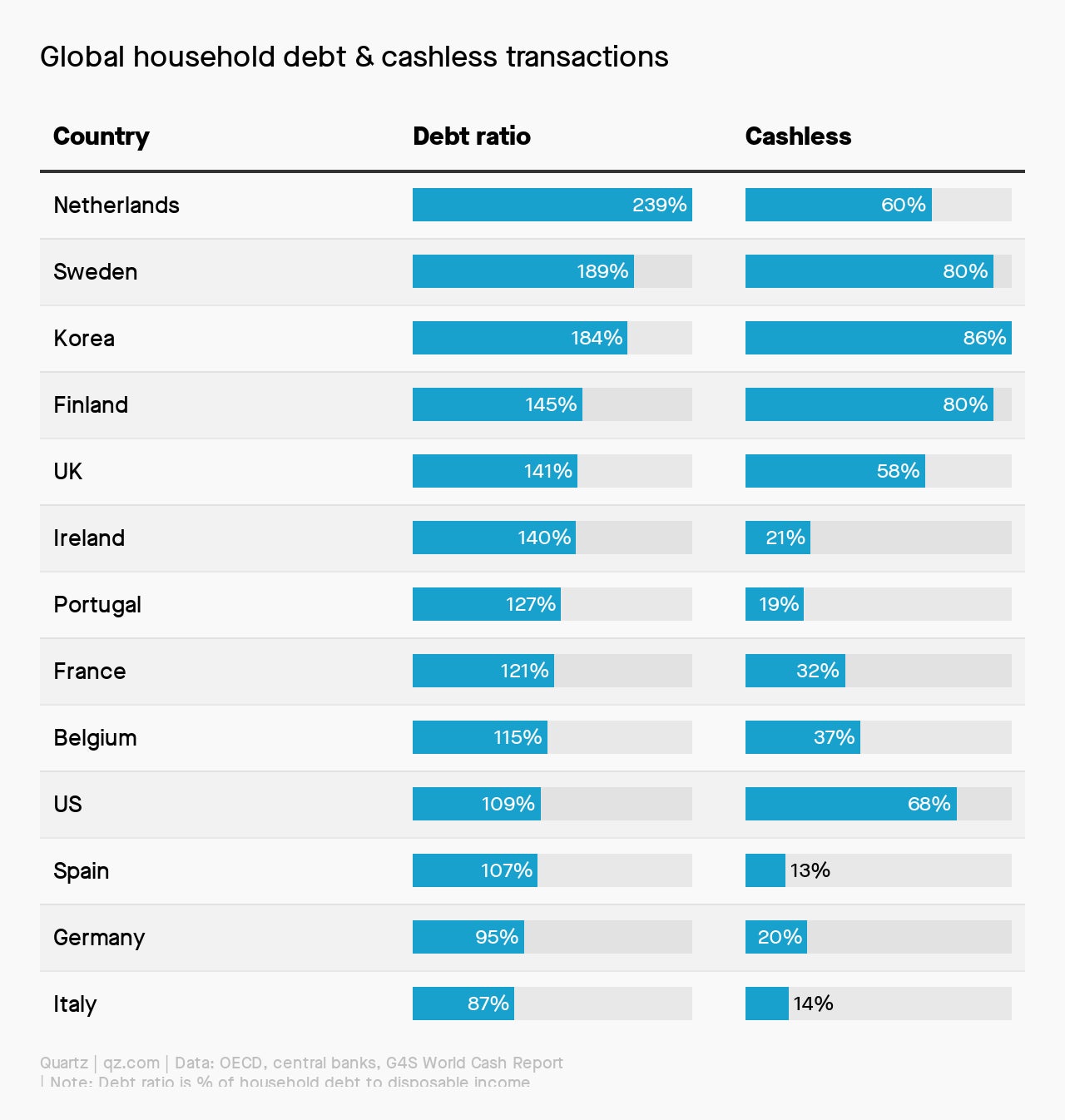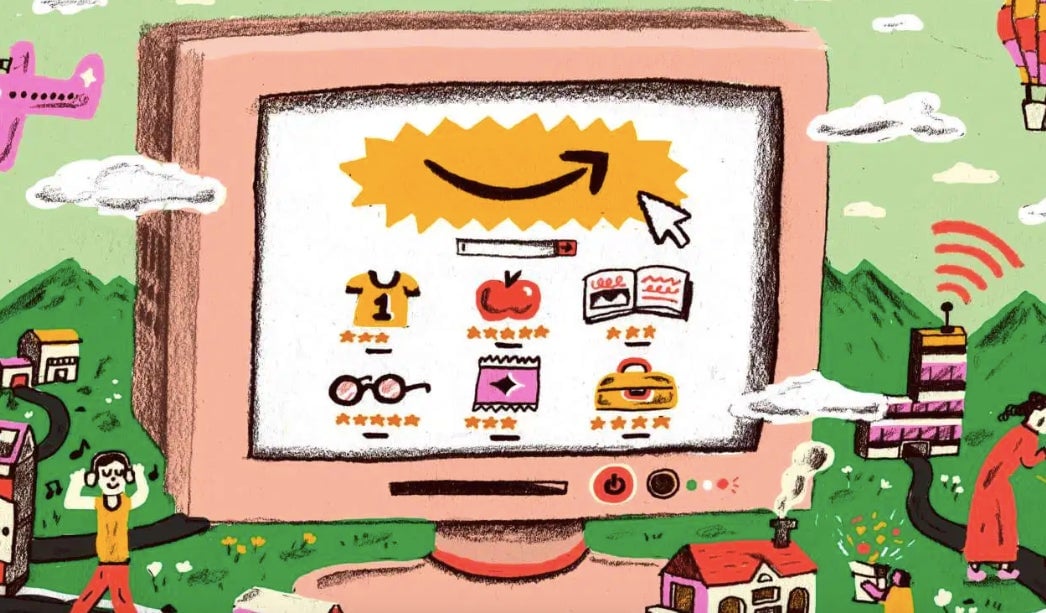Future of Finance: Finland’s cash crunch, Mastercard in China
Welcome back! If you’re new, sign up here to receive this free email every week.

Welcome back! If you’re new, sign up here to receive this free email every week.
Hello Quartz readers!
This week Bloomberg had a story about Finland’s central bank and its plans to teach cheerful Finns about personal finance. Central banks are usually focused on things like promoting employment and keeping the financial system from spinning out of control. Surprisingly, teaching personal finance to the masses could help the country’s policy makers with these lofty objectives.
The trouble for Finland is that household debt has doubled during the past two decades, and 7% of people, a record for the country, can’t pay their bills. Rock bottom interest rates are clearly part of the story. But Olli Rehn, the governor of the Bank of Finland, thinks cashless payments are also a culprit. Consumers are going digital, but some people have a harder time budgeting when they leave physical notes and coins behind.
If you squint a little, you might see a little correlation between countries with heavy household indebtedness and their percentage of cashless transactions (although there are plenty of other factors at play, like interest rates, culture, and economic growth).

Rehn’s comments are backed up by research showing that mobile payment users tend to have worse outcomes in their personal finances. “If we make it very easy to spend and with the click of a button, it is more likely that people do overspend or do not keep track of what they are doing,” Annamaria Lusardi, a professor at George Washington University School of Business, said in an email. As an example, she says people lost track of what they were spending when electronic toll booths were introduced on highways.
When technology creates a problem, there’s usually a person around the corner carrying another new technology to fix that problem. Whizzy apps are springing up to help with budgeting and personal finance. But research has suggested that using phones to track spending doesn’t necessarily help, and some users may make even worse decisions. Fortunately, Lusardi says her research has shown financial education helps people make better decisions, even if they’re spending with cards or mobile wallets.
So why should Finland’s central bank get involved? Heavy debt burdens are a problem for all of society, not just the people who go through the anguish of not being able to their bills. When they default, over-indebted consumers can damage banking systems and spark recessions, leading to higher unemployment.
This suggests that the Finnish central bank’s plan to provide financial education could be good way to keep its banks solid and to keep Finns working.
Mastercard in China
Speaking of cashless transactions, Mastercard has, at long last, gotten access to China’s $27 trillion payment market. The People’s Bank of China approved the US card company’s joint venture application. Within one year it will be able to apply for formal approval to operate domestically.
This looks like a bigger win for Beijing than for Washington. China has said it will improve foreign access to its financial system as part of the “phase one” trade deal with the US. But as far as Mastercard is concerned, China’s country’s payment system is dominated by homegrown giants Alipay and WeChat Pay, as well as its UnionPay card service. China gets the PR of opening up without giving much away.
Indeed, Mastercard CEO Ajaypal Banga didn’t sound especially bullish when he talked about China with analysts in January before the PBOC announcement:
“We are late to the party because the digital players there have already built substantially good businesses and, frankly, with very good offerings. So they deserve to have won what they’ve won. The question will be, how do we then break in and how well do we do in that, and that’s going to be our task in China.”
This week’s top stories
1️⃣ Kenya is beset by a wave of high-interest loans from tech startups. People who used to borrow mostly from friends and family are now inundated with ads for quick money and calls from debt collectors, Bloomberg reports.
2️⃣ The PBOC has filed more than 80 patents (paywall) to digitize the renminbi, according to the Financial Times. The system could make it easier for China to control the amount of cash in circulation and to track what is being done with the money.
3️⃣ Deutsche Bank has invited Microsoft, Google, and Amazon to pitch to overhaul its creaky, outdated tech systems, Reuters reports. It’s part of a $14 billion technology investment as the German company seeks to recover from years of losses.
4️⃣ Digital bank N26 is leaving the UK. The company blamed Brexit, though it’s pretty clear that N26 had little traction in Britain. The decision suggests that costs are starting to matter (even for well-funded startups), that the world’s fragmented banking systems are prone to staying that way, and that the window for starting a new mobile bank could be starting to close in some places.
5️⃣ JPMorgan has given fintechs a July deadline to sign up to data sharing agreements. The biggest US bank by assets is looking to get rid of “screen scraping,” an insecure form of data collection. Reuters reports that 95% of companies that request data already have an agreement.
The future of finance on Quartz
Around 25% of the capital raised by UK fintechs last year was led by SoftBank’s Vision Fund. The statistic underscores concerns that companies in its portfolio could be overvalued and may actually have too much money.
Varo Money is poised to become a full-fledged bank in the US—a journey that has taken three years and cost nearly $100 million. The slow and expensive process is a reason why the incumbent banks have been resistant to the tech disruption roiling other industries.
Uber is out of the food business in India, but it’s making a push in finance. The ride-hailing company has a team of more than 100 technology employees at its Hyderabad tech centre working on Uber Money.
PhonePe is looking to grow by making it easier for consumers in India to withdraw cash. The Walmart-based payment company hopes the move, which may seem counterintuitive for a digital app, will boost its user base of 185 million.
A growing chunk of global card payments are going through Apple Pay. Research firm Bernstein says Apple is on pace to account for 1-in-10 such payments by 2025.
Elsewhere on Quartz

Amazon is unrivaled in e-commerce. With a trillion-dollar valuation and a business that spans everything from in-house brands to third-party inventory, Amazon has built its empire by disrupting US retail. Quartz’s Marc Bain reports on how an online bookseller came to redefine an industry and what competitors are doing to keep up.
Always be closing
- Klarna, the Swedish lender, acquired pay-later startup Moneymour.
- Starling got £60 million ($78 million) (paywall) of investment. The London challenger bank’s deal was led by Merian Global Investors.
- Tandem, a UK startup bank, is expected to raise £50 million, according to Sifted. The startup bank had reportedly targeted £100 million.
- Nova Credit raised $50 million. The US startup helps immigrants get access to credit.
I hope your week has been a profitable one (pick your own metric). Please send person finance advice, tips, and other ideas to [email protected].